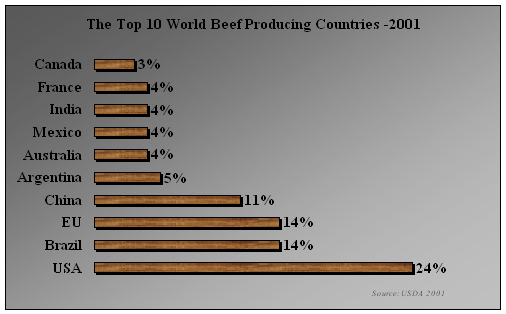BSE was reported in the USA last week and the meat industry is gripped with fear on what cost will a sick cow have on the multi-billion dollar industry.
The American beef industry is estimated at USD 175 billion, which includes retail sales and related businesses such as equipment and feed supplies. The USA is the world’s largest beef producer churning out more than 11 million tonnes per annum, and it is the second largest exporter with foreign sales accounting for 10 percent of domestic production.

The Canadian meat industry was crippled by the BSE scare earlier this year. BSE was described as the greatest threat and shock faced by the Canadian agricultural sector; the Canadian government estimates losses of USD 2.5 billion by the beef industry.
If the impact on the Canadian meat industry is an indicator then the ramifications of BSE will be huge and the effects will be felt by the whole American economy. Beef is a staple food for many Americans and the restaurant, food retailer, and financial service sectors will all be affected. A 2001 study by the American government estimated damages caused by BSE could be in the tune of USD 15 billion.
Shares of meat companies like Tyson and McDonald’s fell sharply when news broke of BSE on Christmas Eve. The US dollar also took a knock in the foreign exchange as fears rocked the financial, grains and livestock markets. Over 30 countries have closed their borders to American beef, threatening the USD 2.6 billion export market.
Amidst the doom and gloom, there is some positive news for companies in the organic meat industry. Sales of organic meat products are projected to surge as consumers’ fear for food safety. Organically raised cattle are not fed animals remnants and there have been no cases of BSE reported on animals that have been raised their entire lives according to organic production methods. Organic beef is thus seen by consumers to be safer to eat than non-organic beef.
The organic meat market has been slow moving compared to other sectors of the American organic food industry. Most organic meat is produced on a small-scale and there is an absence of distribution infrastructure. Farmers’ sell significant volume of organic meat directly to consumers, and that which is marketed by retailers is usually priced three times higher than non-organic meat products. These are reasons for organic beef to have less than 1% share of the beef market in 2003.
The impact of BSE on the organic meat industry is to be multi-fold:
1. Consumer demand – Organic meat sales have soared in Canada since the BSE scare in May 2003, expanding by over a third in 2003. Organic beef sales in the USA could double in 2004 if suppliers can get sufficient volume into retailers.
2. Retailer interest – there has traditionally been low interest from retailers to market organic meat products. This is partly because of the success of natural meat products, which are seen by many consumers to be similar to organic meat products. BSE is elevating consumer awareness of organic meat products and retailers are likely to respond by introducing these products in their stores. Albertson’s is the only mainstream supermarket marketing organic beef in 2003 and others are expected to follow its lead.
3. Conversion rate – The fall-out of the BSE scare is to make many meat producers consider organic farming methods. Only 0.2% of American pastureland and rangeland is certified organic, however a large rise in organic farmland is predicted as more meat producers take the organic route.
4. Supply chains – The formation of supply chain is to accelerate as retailers demand greater volume from organic meat suppliers. Companies like Dakota Beef are poised to take advantage as they are setting up strong supply chains from farmers to retailers. More conventional meat companies are likely to enter the organic meat sector and utilize their distribution infrastructure.
5. Imports – Demand for organic meat products could surpass supplies in 2004 creating opportunities for exporters in other countries. In 2003, organic beef and organic pork was imported into North America from Australia and Europe. Latin American companies are already looking to capitalize on opportunities caused by the BSE scare.
In conclusion, the effects of the BSE scare are to be profound. The fall in consumer confidence and export ban could devastate the meat industry, affecting the recovery of the American economy. A shake-up of the meat industry is envisaged in which the U.S. Food & Drug Administration (FDA) will raise livestock production standards and place tighter controls.
The BSE scare is poised to accelerate growth in the organic meat sector. Sales are expected to surge since many Americans see organic meats to be safer than non-organic meats. The North American market for organic meat products is to show high growth with organic beef sales projected to expand by over 50% in 2004.
High market growth rates will not continue indefinitely though, and the long-term success of organic meat products depends upon how they are positioned in the marketplace. Consumer confidence in non-organic beef will eventually return and as this happens, there will be stiffer competition from natural meats, free-range meats, and conventional meats – all of which are likely to be produced according to higher standards. Until then, organic meat companies are likely to make hay while the sun shines.
Related report: The North American Market for Organic Meat Products
Posted: December 30th 2003

